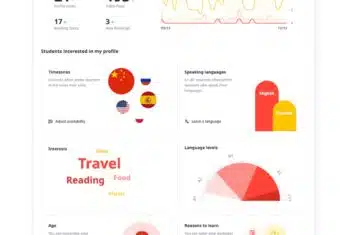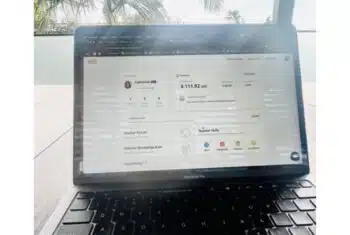With the plethora of online platforms offering English language lessons to learners, and teaching positions to English teachers and tutors, it is difficult to know which online teaching companies are legit.
We’re going to get to the bottom of this by asking those who know best: the teachers themselves.
In this series, we’ll talk to teachers currently teaching online in 2025 and ask them the important questions.
Meet Catherine, a teacher on italki

Hi! My name is Catherine and I am 25 years old from New Zealand. When I started italki I was still a university student. I left my job in hospitality due to the COVID pandemic so I decided to try teaching English online. Currently I have a Bachelor’s degree in Business and recently completed the Level 5 TEFL Diploma through The TEFL Academy.
On italki, I usually give casual lessons in conversational English with learners across different ages and levels from all around the world. Since italki is 100% online, I’ve been able to teach both in New Zealand and abroad during my travels in countries such as Spain, Japan and Peru.
Why did you choose italki?
Since italki allows community tutors, native English teachers can start teaching without any formal qualifications or experience, making it ideal for students or anyone wanting to try teaching English on a casual basis. Fast forward more than 4 years and I continue to enjoy the italki platform.
Read more: How To Work Abroad With No Experience
What has been you experience with italki?
I first started teaching on italki in June 2021. Overall I have had a good experience. It has allowed me to interact with people from all around the world. I always leave my lessons feeling like I have learned something as well.
How easy was it to start teaching on italki?
I started over 4 years ago and I believe the platform has become more popular and thus more competitive for potential teachers, but this doesn’t mean new teachers can’t apply.
From memory when I applied, it was a fairly quick process. I remember I needed to submit an introduction video which was about 1 minute long to introduce myself and discuss my experience and teaching style. Once this was approved, I had to attend an orientation which was basically a zoom meeting, where they explained a bit about the platform and how to get started teaching.
Afterwards I was good to go.
Read more: Online Teaching Platforms You Need To Know
Does italki allocate students to you?
As a teacher you set your availability and the exact hours you are able to teach.
Students can then book a slot. For example, ‘a 60-minute lesson from 3pm to 4pm’ and the teacher can either accept or decline their request. Occasionally the lesson time will change and this can be agreed upon with both parties.
Overall it’s very flexible which is nice as often when I travel, my schedule changes dramatically and I can choose exactly when I want to teach.
How much do teachers earn on italki?
The price of lessons is very flexible. Each teacher essentially can set how much they want to charge.
Currently I am charging $15 for a 60-minute class and $8 for a 30-minute class.
Of course, salaries are highly subjective depending on where someone is from or where they choose to live. For example, if I were to find a job in a cafe here in New Zealand, I would likely make more money. But when I worked in Japan I was making less than $10 an hour.
Currently italki takes a 21% commission rate for single lessons. By no means am I an expert on economics, but I do believe starting off with a low price usually makes sense and prices can easily be increased with time, experience and demand.
What does a typical day look like for you?
Currently I don’t have a standard schedule. Some days I can teach three or four hours and other days I have no lessons at all.
Since my lessons are primarily conversational, this tends to attract more casual learners who just want to practice speaking and generally aren’t too interested in grammar. As a result I don’t need to do any preparation prior nor do I assign homework or additional work outside of class time.
Usually my lessons begin with an introduction where I ask questions to get to know my students and then the conversation flows from there. After many years I believe I have gotten good at talking with anyone and know how to ask appropriate and engaging questions.
What are your students like?
All my lessons are private 1-on-1 classes.
One of my favourite parts of teaching online with italki is the diversity of students. One day I can be teaching a businessman from South Korea and the next a teenager in Brazil.
For me it can change frequently and there is no typical student. Some people book one lesson and disappear, while others book daily lessons for weeks at a time.
Being from New Zealand, I believe has helped as there are not many New Zealand tutors available. This means if someone has a special interest in the country, for example, they are moving to study, work or are simply are curious about the accent, it’s likely they will end up booking a lesson with me.
I also enjoy sharing my culture and teaching others about our accent, customs and what life is like in Aotearoa.
How does the feedback system work?
Each teacher has their own profile where students can view an introduction video with information such as how many lessons they have completed along with the number of students they have taught, and written reviews from past students.
As the platform evolves, it’s apparent they have unique algorithms which promote certain teachers to certain groups. While I cannot discuss for sure how it works, the obvious assumption is good ratings will help you secure new clients. After each lesson, teachers can also leave their students a review about the lesson.
I remember when I first started, I was worried nobody would book with me since I had no reviews, but it never seemed to be a problem as I quickly got new requests. I believe that since people can book single lessons with little commitment, it is low risk so they are always willing to give new people a chance.
Have you experienced any technical issues?
This is very dependent on where I am exactly.
Usually if my internet connection is good, I don’t experience any major problems. Usually issues arise when I am travelling and the internet isn’t good so the platform can lag or disconnect. Generally I prefer to teach via Google Meet or Zoom which can be selected by the student instead of the italki online classroom.
Does italki offer support to teachers?
In my experience, I have always felt Italki has had a great community and support system for teachers. Since it started off as a language exchange platform, many teachers are also students themselves and generally have an interest in sharing their
culture and language.
There are many community forums and question and answer sections available. Since its conception in 2007, it has constantly grown and evolved and continues to attract new learners and teachers.
Is teaching on italki sustainable as a full-time job?
For me italki has never been full-time and I don’t expect it to be. Although I have heard many people making a good living on Italki, I can’t see this happening for me. It has always been something I did part-time, somewhat as a hobby or side hustle if you will.
The way I operate, all my lessons are very individualised and there is no template that I follow or specific questions I ask. I think also for me it’s fun to do for a few hours, but 8 hours a day would likely be very draining and frankly unsustainable for me.
Another important point to consider is that on italki, you are considered an independent contractor so there are no additional benefits like healthcare, holiday pay, or sick leave. Even though the flexibility is attractive, this also means uncertainty and hours are never guaranteed.
As much as I have appreciated the freedom of choosing when and where I want to work, you have to recognise this lifestyle is not for everybody.

Would you recommend teaching on italki?
For prospective English teachers interested in teaching, I would recommend italki. It doesn’t cost anything to register so I believe there is no harm in trying.
As for me I will continue to teach on a casual basis but realistically I know I still have to seek other opportunities as the income is simply not enough for me to be a full-time job.
Author Bio
Teacher in the Field represents our TEFL Academy global community sharing their real-world experiences from classrooms and institutions across the world. From diving into TEFL to chomping down on chow mein in China, to navigating your first-day nerves in Spain, our collective voice brings authentic stories, insights, and practical advice right from those living the adventure.
Read
Teacher in the Field's story →
 United States
US
United States
US

















